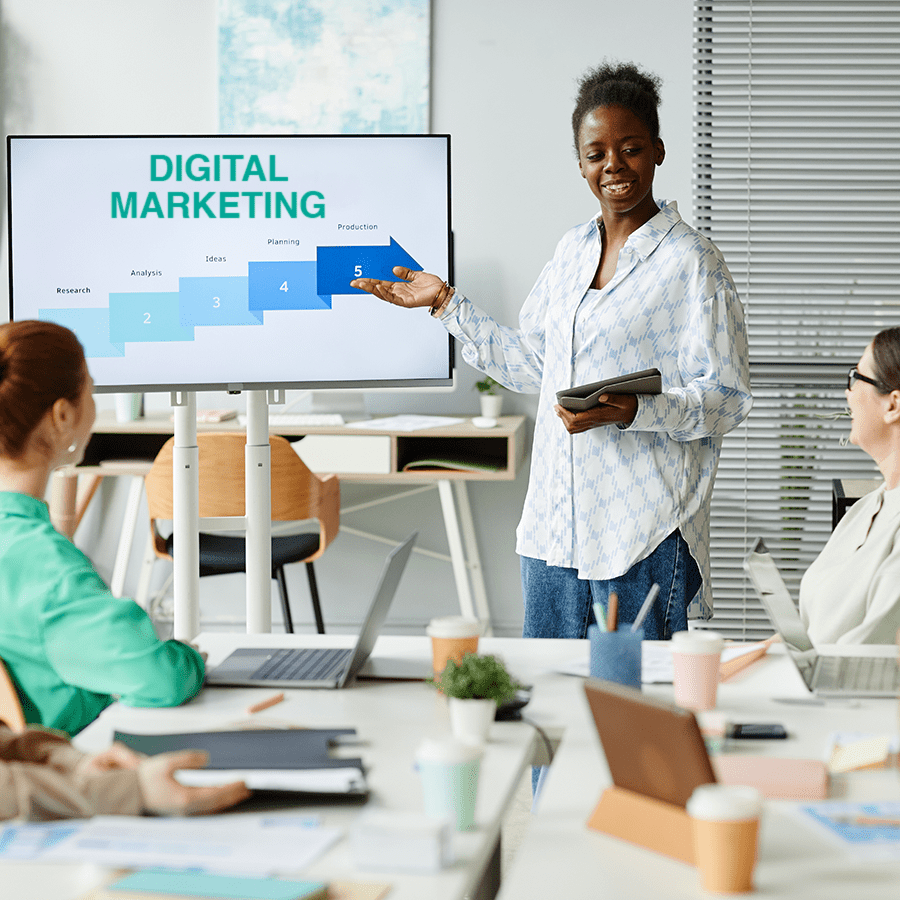Digital Marketing for Entrepreneurs – The Basics
In today’s fast-paced digital world, having a strong online presence is non-negotiable. But with so many options and platforms available, it can be overwhelming to know where to start, and easy to jump on the ‘bandwagon’ of every new platform in the hopes of finding that ‘silver bullet’ that will deliver for your business. The net result is that many entrepreneurs waste time and money (valuable resources they just don’t have) on digital tactics that don’t yield business results.
What is Digital Marketing and Why it is Important?
Digital marketing, also known as online marketing, refers to the promotion of brands using the internet and other forms of digital communications that allow brands to connect with customers and consumers through platforms such as email, mobile, social media, websites, online communities, webinars, and other video-based content.
Businesses need to incorporate digital marketing into their overall marketing strategy, as it helps them appeal to a much larger audience than traditional marketing methods, with its reach being worldwide. Digital platforms also provide analytics tools, allowing businesses to track their audience’s behaviours and engagement, providing them with invaluable insight that lends itself to continuously adjusting their strategy as behaviours and trends change.
Digital Marketing Tactics
While many tactics can be used to establish your online presence and grow your digital footprint, not all tactics are necessary and the best ones to use are dependent on your strategy and the goals you wish to achieve. Below are some of the ‘basics’ our digital expert recommended all businesses should have in place.
Website
Regardless of your industry or business size, having a website is non-negotiable and important to your business’s success. Most businesses don’t realise that most of their customers will visit a website before making a purchase.
Google My Business
Google My Business, or GMB, is a free tool that lets you manage how your business appears on Google Search and Maps. It is essentially a ‘mini site’ for your business. Google My Business allows you to list information such as your company name, trading hours, and location. It allows people to reach out to you without even going to your website and allows you to respond directly to their message, for them and others to see. It also has the option for those who have engaged with your brand, to leave a review, which is key in converting future leads – reviews are highly encouraged, and the more reviews, good or bad, the more credible your business becomes.
GMB is key to increasing your business’s online visibility, engaging with current and potential consumers, as well as highlighting your business by showing what makes it unique.
Not only is Google My Business great for consumers, but for the business owners themselves, as it provides insights such as how your business was searched – Google Search or Google Maps – as well as consumers’ interactions with your page.
Social Media
Rather than having a presence on all social platforms, be present on the platforms that count. When selecting the best platform/s for your business, it is important to consider your products and services, brand personality, business type, and resources available; for example, if you are a highly visual brand, Instagram is a great place to be, and for those more businesses focused,
LinkedIn would be your platform of choice.
You also need to consider, your competitors– where are they? What are they doing that works, what do they do that doesn’t, and how engaged is their audience on each channel? More importantly, where YOUR audience is.
Email Marketing
Email marketing is another great tactic, which also gives you multiple options to choose from for how you communicate with your audience. Email marketing can be used to make customers aware of new products and services, provide special offers, inform them of initiatives you are involved in, provide general business updates., and keep you top-of-mind in-between sales.
Search Engine Optimisation (SEO)
SEO is the process of improving your site to increase its visibility and attract prospective and existing customers when they search for related products and services.
SEO boosts your credibility, supports content marketing, maximises Pay Per Click (PPC) campaigns, and provides you with a competitive advantage against those that don’t implement SEO at all or correctly. SEO improves engagement, and reach, and increases your ranking in local searches.
Conclusion
With the aid of digital marketing and the tactics you choose based on your objectives, you can reach larger and more relevant audiences than is possible through more traditional methods. It is also more cost-effective and enables you to measure success daily. Changing tactics is easy, and the insights you can gain through digital marketing are invaluable.
The fact is, the online marketplace is competitive and while word of mouth and customer recommendations can help drive traffic, customers will struggle to find your business unless you show up in the places they spend time – which is mostly online.

